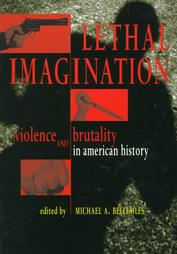Lethal Imagination
According to the Emery University Violence Studies Newsletter, Fall 1999, a then new book was announced that appears to include an essay on Lizzie Borden. Says the newsletter:
While helping to organize the Violence Studies Program two years ago, Professor Michael Bellesiles discovered that there was no general history of American violence. Encouraged by New York University Press, Bellesiles brought together twenty original essays in the volume Lethal Imagination: Violence and Brutality in American History, which has just been published.
This book includes articles by: Emory Professors Catherine Ross Nickerson, English and ILA, on Lizzy Borden; Professor Mary Odem, History, on the cultural and social contexts of rape; Dr. Arthur Kellermann, Director of the Center for Injury Control, on the impact of gun ownership; and Uche Egemonye, a student in the Law School, on African American women and
yes, the quote just ends. This is how it is in the newsletter.
Anyhow, I ordered the book and will report back regarding Dr. Nickerson’s article. By the by, Nickerson’s essay was reviewed by Lisa Zawadzki in the October 1999 Lizzie Borden Quarterly. It pays to reread those gems every once in a while. You never know what you will re-discover!
Here is a complete list of the book’s contents:
Lethal imagination : violence and brutality in American history (Michael A. Bellesiles, ed.; 1999). Includes Introduction / Michael A. Bellesiles — Kieft’s War and the cultures of violence in colonial America / Evan Haefeli — “Shee would bump his mouldy britch”: authority, masculinity, and the harried husbands of New Haven Colony, 1638-1670 / Ann M. Little — Colonial and Revolutionary era slave patrols of Virginia / Sally E. Hadden — The social origins of dueling in Virginia / Bruce C. Baird — Women of domestic violence in nineteenth-century North Carolina / Laura F. Edwards — Complicity and deceit: Lewis Cheney’s plot and its bloody consequences / Junius P. Rodriguez — Good men and notorious rogues: vigilantism in Massac County, Illinois, 1846-1850 / Nicole Etcheson — Armed and “more or less dangerous”: women and violence in American frontier literature, 1820-1860 / Laura McCall — Seduced, betrayed, and revenged: the murder trial of Mary Harris / Lee Chambers-Schiller — To live and die in Dodge City: body counts, law and order, and the case of Kansas v. Gill / Robert R. Dykstra — Word and deed: the language of lynching, 1820-1953 / Christopher Waldrep — “The deftness of her sex”: innocence, guilt, and gender in the trial of Lizzie Borden / Catherine Ross Nickerson — Treat her like a lady: judicial paternalism and the justification for assaults against Black women, 1865-1910 / Uche Egemonye — “The Negro would be more than an angel to withstand such treatment”: African- American homicide in Chicago, 1875-1910 / Jeffrey S. Adler — Homosociality and the legal sanction of male heterosexual aggression in the early twentieth century / John C. Pettegrew — “The unspeakable Mrs. Gunness”: the deviant woman in early-twentieth-century America / Paula K. Hinton — Cultural representations and social contexts of rape in the early twentieth century / Mary E. Odem –Violence by design: contraceptive technology and the invasion of the female body / Andrea Tone — The Monroe Rifle Club: finding justice in an “ungodly and social jungle called Dixie” / Craig S. Pascoe — Armed and dangerous: guns in American homes / Arthur L. Kellermann and Philip J. Cook.





